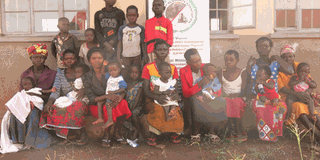Encourage women to speak up about climate change

Government should also ensure that women and children are involved in all parts of project planning and developments through a meaningful consultation. PHOTO/FILE
Women play vital roles in development of our society. Unfortunately, they are often left out of the planning and decision making of our societal agenda.
The exclusion of women in the decision making and governance of key aspects such as natural resources like land, water, forests, among others, is detrimental.
It should be noted that women are key custodians of natural resources and they have inherent and traditional knowledge of climate resilience, adaptation and conservation among other diverse knowledge.
According to the intergovernmental panel on climate change, “Gender is a key axis of social inequality that intersects with other systems of power and marginalisation, including race, culture, class/socio-economic status, location, sexuality, and age to cause unequal experiences of climate change vulnerability and adaptive capacity.
In 2006, commercial deposits of oil were discovered in Uganda in the Albertine rift a rich and critical biodiversity area. This news came with a lot of excitement among the oil host communities and Uganda at large, and yes, there is too much hope that perhaps oil is a savior to Uganda’s economic development and a path to the long awaited middle income.
I live in Hoima, one of the oil host districts and the excitement is too much among the people in this region that when oil production starts, there is going to be a lot of employment opportunities for local people. Unfortunately, little attention is being paid to the social, economic and environmental costs that will come with oil and gas activities and how people especially women can prepare themselves to adapt to the likely challenges.
Meanwhile, the group of civil society organizations that are trying to advance the narrative about the negative impact of fossil fuels on our social, economic and environmental aspects are being tagged as “anti-development project” and different other names, indeed the civic space is shrinking and with Covid 19, it’s extremely difficult to hold community sensitization meetings.
I also believe that perhaps oil will lead Uganda to its dream of becoming middle income, but it is important to weigh the social, economic and environmental impacts.
In my opinion, I think government should support and invest a lot in preparing the communities in terms of building their resilience and adaptive capacity to respond to the likely negative impact of climate change.
The preconceived narratives about employment opportunities will create a lot of tension among Ugandan communities especially the people in the oil host communities when they realize that there is no or limited jobs for them in the sector.
Government should increase funding for agriculture in the region to counteract the preconceived narrative about employment opportunities, yet the sector will not employ everyone.
Government should also ensure that women and children are involved in all part project planning and developments through a meaningful consultation to enable them take part in the decision making and governance of natural resources.
Christopher Opio,
[email protected]




